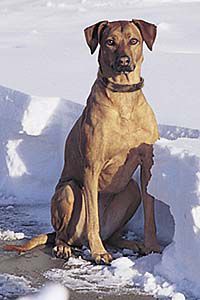| While pets still need to get outside in the winter, precautions need to be taken to ensure their safety. |
For adults and children alike, preparing for the winter can be as simple as unpacking the winter coat, long underwear and sweaters and simply bundling up when heading outside. For the four-legged members of the family, however, more than a few wardrobe changes are necessary to make it through the harsh weather that lies ahead.
Because animals often love to go outdoors (especially dogs in the snow), it can be hard to tell whether or not winter weather is negatively affecting the family pet. That makes it all the more important that pet owners pay particular attention and take certain precautions before pets take to the great outdoors this season.
•Limit outdoors time. While it can seem as though your pet is growing restless and reckless indoors during the colder months, time spent outside should be limited. When the temperature is below freezing, frostbite and hypothermia can occur within minutes in some dogs. Typically, dogs with low body fat and a thin coat are most susceptible to these conditions.
Symptoms of frostbite include swollen skin, a pinkish discoloration of the skin and blistering of the skin within a few days after the frostbite settled in. In general, frostbite will occur on the tips of the ears, tail and feet.
Symptoms of hypothermia are less physical, and tend to be reflected in the animal’s attitude and behavior. Mental dullness, unresponsiveness, depression, and even loss of consciousness can be the result of hypothermia.
•Keep pets away from the garage and driveway. During the winter months, vehicles need antifreeze to combat the cold weather. Should that antifreeze leak onto a driveway or garage loor, this is potentially lethal to pets, who are attracted to the taste of antifreeze. Even if only a small amount of antifreeze is ingested by a pet, that’s all it takes to destroy that animal’s kidneys. Initially, exposure to antifreeze will show itself through disorientation and general stupor. The next step could be coma or death. With such serious consequences, be sure that pets aren’t exposed to antifreeze by cleaning up spills, placing antifreeze containers in places pets cannot reach and keeping animals away from the driveway or garage throughout winter.
•Clean a pet’s paws once you head back inside. Many people use chemical-based solutions to remove ice and snow from their sidewalks, and lots of municipalities use such solutions on the streets as well. Unfortunately, these chemicals can be harmful to pets. Once a pet walks on a surface with those solutions, the chemicals tend to stick to a pet’s paws. Many pet owners notice that during the winter months pets begin to lick their paws the moment they return indoors. That’s because the chemical-based solutions tend to have a sweet taste to pets, but the chemicals, if ingested, can be harmful. If you don’t have covers to place on your pets’ feet, be sure to rinse off any chemicals the moment you and your pet arrive home from a walk. The salt and chemicals can also burn or irritate paws.
•Be especially careful with puppies. Puppies are popular gifts around the holiday season when the weather is typically very cold. While it’s important for puppies to get outdoors and get their exercise, puppies cannot regulate their own body temperature, and therefore are even more susceptible to cold weather than older dogs. In general, keep puppies out of the cold weather as much as possible.
•Keep water as available as it is during the summer months. Many pet owners make the mistake of assuming a pet doesn’t need as much water in the winter months as it does in the summer when the temperature is warmer. However, pets can become dehydrated in the winter as well. Because dehydration accelerates both frostbite and hypothermia, keep a bowl or two of fresh water available for pets throughout the day. Don’t assume that because your dog is eating snow during a walk that that is sufficient water. Rather, snow requires ample body heat to digest, and actually accelerates dehydration when ingested.
•Feed a pet a healthy diet. Calories are a good friend to pets during the colder season because pets generate body heat by burning fat. Many generic dog foods, for example, aren’t healthy for pets in the winter season because they simply don’t provide enough calories for a pet to generate a significant amount of body heat. Premium dog foods, while slightly more expensive, are far better at helping your dog generate the type of body heat he will need to stay warm when heading out in winter weather.

